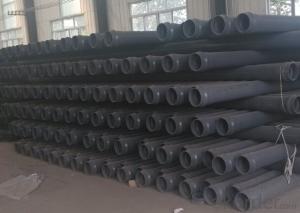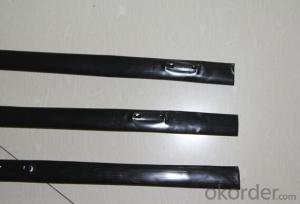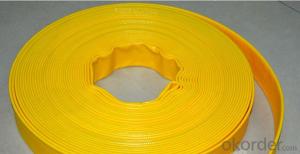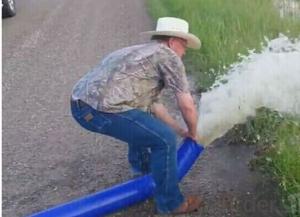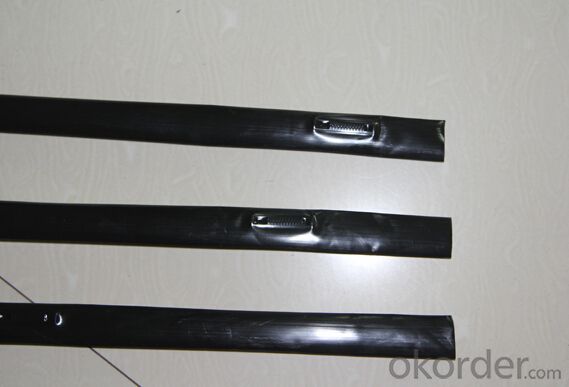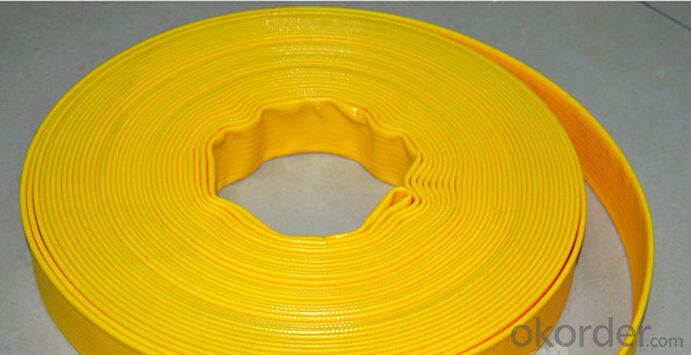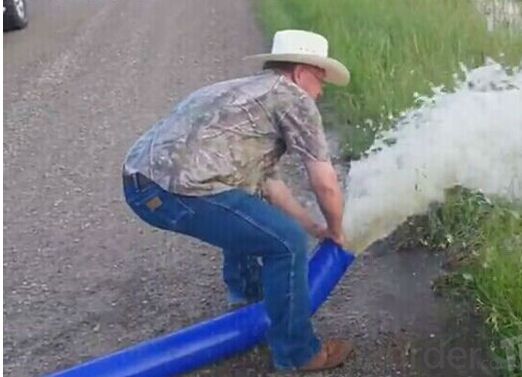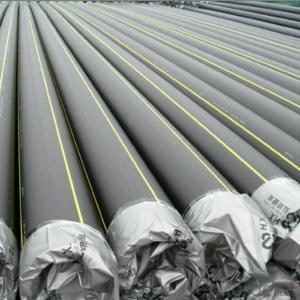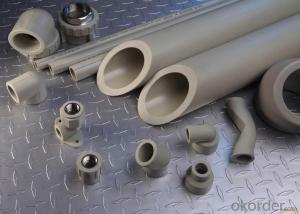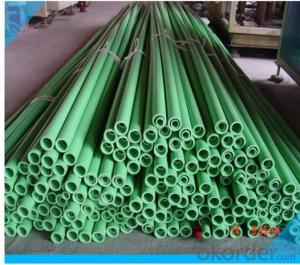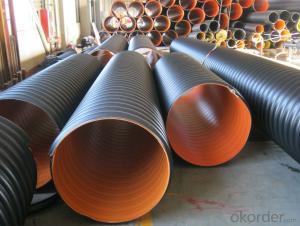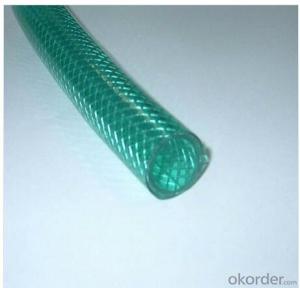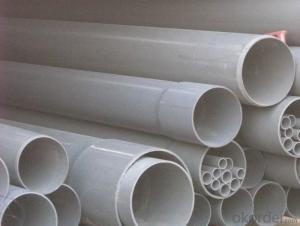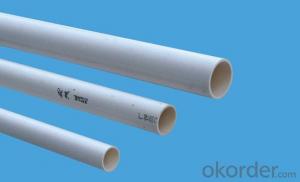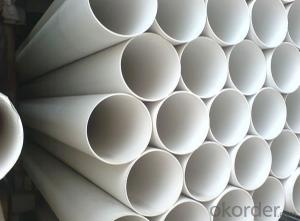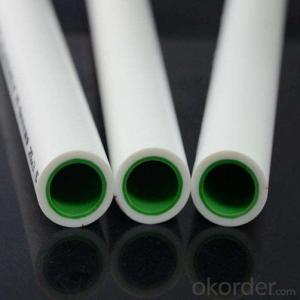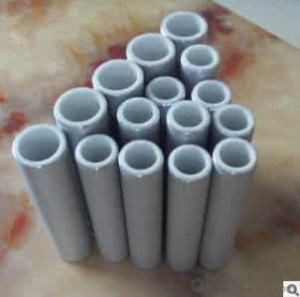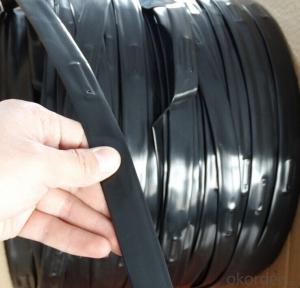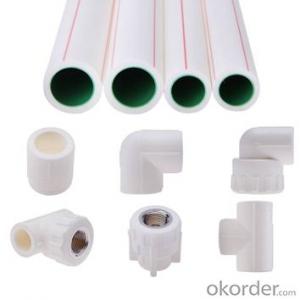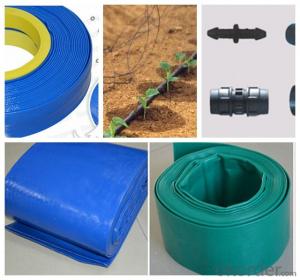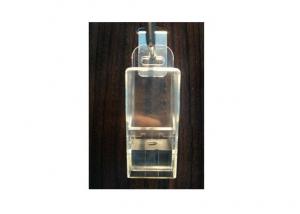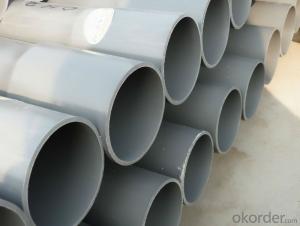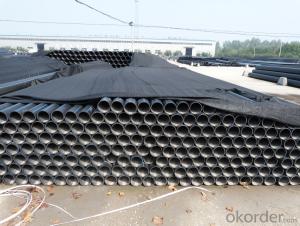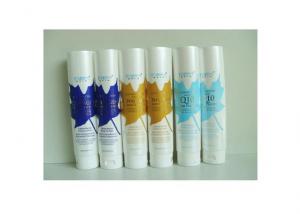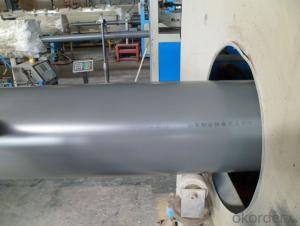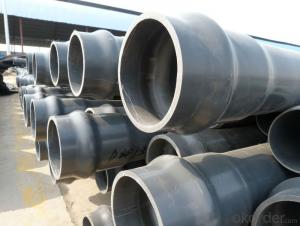Plastic Tubes for Agriculture Drip Irrigation Tape with Fitting Parts
- Loading Port:
- Tianjin
- Payment Terms:
- TT OR LC
- Min Order Qty:
- 888 m
- Supply Capability:
- 999999000 m/month
OKorder Service Pledge
OKorder Financial Service
You Might Also Like
Advantage of Water Drip Irrigation Lay Flat Hose Pipe
1.Cutting down production costs.
2.Decreasing damage from insects.
3.Increasing productivity.
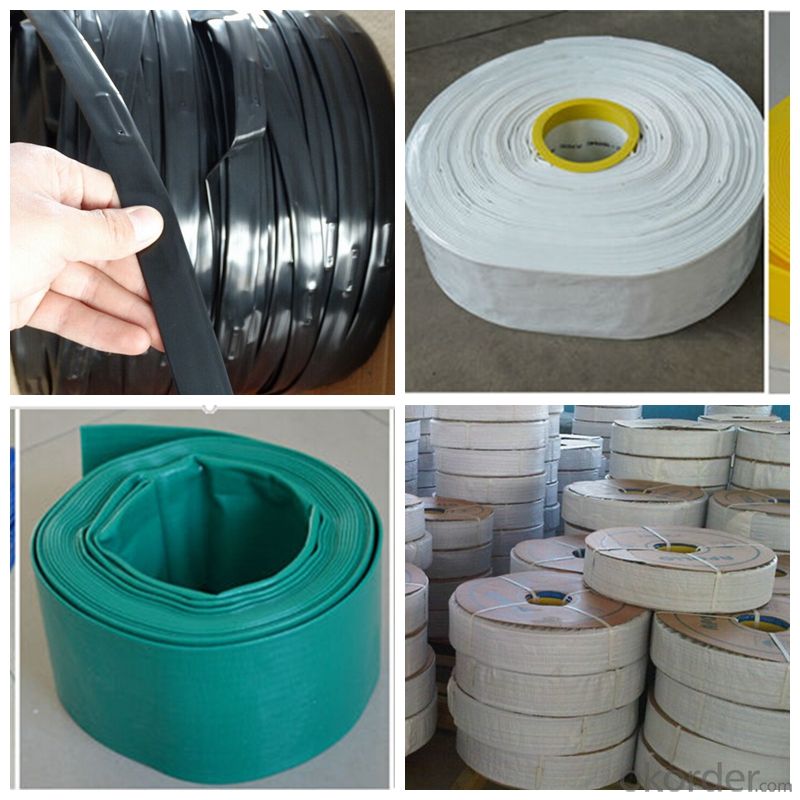
The specification of Water Drip Irrigation Lay Flat Hose Pipe
| Part No. | Inch Size | I.D | O.D | Thickness | W.P. | B. P. | Length |
| inch | mm | mm | mm | bar | bar | m/roll | |
| GNSD20-22.7 | 3/4" | 20 | 22.7 | 1.35 | 7.0 | 21.0 | 100 |
| GNSD20-23.1 | 3/4" | 20 | 23.1 | 1.55 | 10.5 | 31.5 | 50 |
| GNSD26-28.6 | 1" | 26 | 28.6 | 1.30 | 4.0 | 12.0 | 100 |
| GNSD26-29.0 | 1" | 26 | 29 | 1.50 | 7.0 | 21.0 | 100 |
| GNSD26-29.4 | 1" | 26 | 29.4 | 1.70 | 10.5 | 31.5 | 50 |
| GNSD33-35.4 | 1-1/4" | 33 | 35.4 | 1.20 | 4.0 | 12.0 | 100 |
| GNSD33-35.6 | 1-1/4" | 33 | 35.6 | 1.30 | 7.0 | 21.0 | 100 |
| GNSD33-35.9 | 1-1/4" | 33 | 35.9 | 1.45 | 10.5 | 31.5 | 50 |
| GNSD41-43.5 | 1-1/2" | 41 | 43.5 | 1.25 | 5.0 | 15.0 | 100 |
| GNSD41-43.9 | 1-1/2" | 41 | 43.9 | 1.45 | 7.0 | 21.0 | 100 |
| GNSD41-44.8 | 1-1/2" | 41 | 44.8 | 1.90 | 10.5 | 31.5 | 50 |
| GNSD45-48.2 | 1-3/4" | 45 | 48.2 | 1.60 | 8.0 | 24.0 | 50 |
| GNSD45-49.0 | 1-3/4" | 45 | 49 | 2.00 | 10.5 | 31.5 | 50 |
| GNSD53-55.0 | 2" | 53 | 55 | 1.00 | 4.0 | 12.0 | 100 |
| GNSD53-55.6 | 2" | 53 | 55.6 | 1.30 | 6.0 | 18.0 | 100 |
| GNSD53-56.0 | 2" | 53 | 56 | 1.50 | 8.0 | 24.0 | 50 |
| GNSD53-57.1 | 2" | 53 | 57.1 | 2.05 | 10.5 | 31.5 | 50 |
| GNSD66-68.3 | 2/1/2" | 66 | 68.3 | 1.15 | 4.0 | 12.0 | 100 |
| GNSD66-69.4 | 2-1/2" | 66 | 69.4 | 1.70 | 7.0 | 21.0 | 100 |
| GNSD66-70.3 | 2/1/2" | 66 | 70.3 | 2.15 | 10.5 | 31.5 | 50 |
| GNSD78-80.1 | 3" | 78 | 80.1 | 1.05 | 4.0 | 12.0 | 100 |
| GNSD78-80.9 | 3" | 78 | 80.9 | 1.45 | 6.0 | 18.0 | 100 |
| GNSD78-82.5 | 3" | 78 | 82.5 | 2.25 | 9.0 | 27.0 | 100 |
| GNSD78-83.0 | 3" | 78 | 83 | 2.50 | 10.0 | 30.0 | 50 |
| GNSD104-106.4 | 4" | 104 | 106.4 | 1.20 | 4.0 | 12.0 | 100 |
Cetificate of Water Drip Irrigation Lay Flat Hose Pipe
SGS report for PVC Layflat Hose, which comply with RoHS Directive 2011/65/EU Annex II; recasting 2002/95/EC.
Applications of of Water Drip Irrigation Lay Flat Hose Pipe :
PVC layflat hose is widely used for drainage in the fields of agriculture irrigation, gardening irrigation,forestry sprinkler irrigation, construction project, industrial and mining.
Package of Water Drip Irrigation Lay Flat Hose Pipe :
PVC layflat hoses are wrapped by plastic woven cloth,with both sides covered by carton board,fix with ropes or packing straps.
Water Drip Irrigation Lay Flat Hose Pipe
FAQ of Water Drip Irrigation Lay Flat Hose Pipe
1.What kind of products do we produce?
The main productions of company are dripping irrigation tubes, sprinkling irrigation equipments,filter, fertilizing system, pipe fitting, tubes, and developments of new technology.
And meanwhile the company can provide customer the technology consultation and service for integratedwater and fertilizer solution.
2.which kind of certificate we have ?
ISO9000 certification is company’s management foundation. The all indicators of productions reached national standard after detecting by Ministry Water Resources Irrigation and Drainage Center and the company obtained the irrigation level II qualification.
3. what is the payment term ?
We accept LC ,TT etc .
- Q: Can plastic tubes be customized with logos or labels?
- Yes, plastic tubes can be customized with logos or labels.
- Q: What is the maximum pressure plastic tubes can handle without bursting?
- The maximum pressure that plastic tubes can handle without bursting depends on various factors such as the type of plastic, thickness of the tube, and its intended use. It is recommended to consult the specifications provided by the manufacturer or conduct pressure testing to determine the exact maximum pressure for a specific plastic tube.
- Q: Can plastic tubes be used for architectural installations?
- Yes, plastic tubes can be used for architectural installations. They are often chosen for their versatility, lightweight nature, and cost-effectiveness. Plastic tubes can be easily cut, shaped, and connected to create unique and innovative architectural designs. They are commonly used for creating temporary structures, such as exhibition displays, and can also be used for permanent installations.
- Q: How are plastic tubes filled with creams or gels?
- Plastic tubes are filled with creams or gels through a process known as tube filling. This involves using specialized machinery that dispenses the desired product into the tubes. The cream or gel is typically stored in a large container or hopper, which is connected to the filling machine. The machine uses a piston or pump system to transfer the product from the container into the tubes. Once the tubes are filled, they are sealed to ensure the product remains intact and hygienic.
- Q: Can plastic tubes be used for oil and gas industries?
- Yes, plastic tubes can be used for oil and gas industries. They are often used for various applications such as transporting fluids, chemicals, and gases. Plastic tubes offer several advantages, including resistance to corrosion, lightweight design, and flexibility. However, specific requirements and regulations must be considered to ensure the suitability of plastic tubes for each application within the oil and gas industry.
- Q: Are plastic tubes resistant to UV degradation?
- Yes, plastic tubes can be resistant to UV degradation depending on the type of plastic material used. Certain plastics, such as PVC (polyvinyl chloride) and HDPE (high-density polyethylene), are specifically formulated to have UV stabilizers that protect against degradation caused by exposure to sunlight. However, not all plastics are inherently UV resistant and may require additional coatings or additives to enhance their resistance to UV degradation.
- Q: How do plastic tubes perform in acidic environments?
- Plastic tubes generally perform well in acidic environments, as they are resistant to corrosion and degradation caused by acids. However, the specific performance can vary depending on the type of plastic used. Some plastics may have higher resistance to acids than others, so it is important to choose the appropriate plastic material for the specific acidic environment.
- Q: What is the minimum wall thickness of plastic tubes available?
- The minimum wall thickness of plastic tubes typically varies depending on the specific type of plastic and manufacturing processes, but it can generally range from 0.5mm to 1mm.
- Q: I got a new syrian hamster two and a half days ago, he has a big wire two storey cage with plastic tubes connecting the upstairs and downstrairs, he's spent mostly all of his time in the tube, taking all the bedding from his little house and his food in it and pooing a lot, I mean the tube is full of poo mixed with food and bedding. (I know this is normal) he's still really shy, he spooks easily, and he's not even been on his wheel yet but he's slowly coming around to me when I hand feed him, I haven't touched him yet though, just leaving him to it for a few days. Should I clean his tubes or is it too early? I don't want to stress him out but I read you are supposed to clean his cage every week and spot clean and clean his toilet area every day and his tubes are his toilet area and I'm seriously not joking when I say he poos a lot.
- I think that you should probably clean it out. Do it at night when he is not in the tubes so you do not disturb him. My hamster sleeps in an attachment that goes on the tubes and she does the same thing with the food, pooping, and peeing in there. She loves when I clean it out for her, I do it about every 2-3 days. If I do not clean it out and wait an extra day if I am busy or something she takes all of the bedding out of it and moves it to the regular cage area herself. So yes I do think that you should clean it, he will probably appreciate it!
- Q: Are plastic tubes BPA-free?
- Yes, plastic tubes can be BPA-free. BPA (bisphenol A) is a chemical commonly found in certain types of plastic that can leach into food or beverages. However, many manufacturers now produce plastic tubes using BPA-free materials, ensuring they are safe for use. It is always recommended to check the packaging or inquire with the manufacturer to confirm if a specific plastic tube is BPA-free.
Send your message to us
Plastic Tubes for Agriculture Drip Irrigation Tape with Fitting Parts
- Loading Port:
- Tianjin
- Payment Terms:
- TT OR LC
- Min Order Qty:
- 888 m
- Supply Capability:
- 999999000 m/month
OKorder Service Pledge
OKorder Financial Service
Similar products
Hot products
Hot Searches
Related keywords
